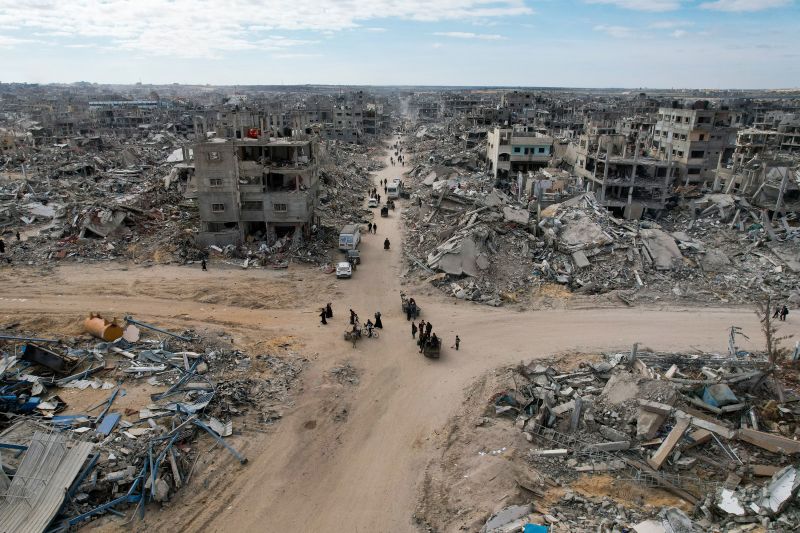
Israel’s defense minister said he told the military to advance plans for what he called a “humanitarian city” built on the ruins of Rafah in southern Gaza, according to reports in Israeli media.
In a briefing to reporters Monday, Israel Katz said the zone would initially house some 600,000 displaced Palestinians who have been forced to evacuate to the Al-Mawasi area along the coast of southern Gaza, multiple outlets who attended in the briefing reported. Palestinians who enter the zone will go through a screening to check that they are not members of Hamas.
They will not be allowed to leave, Katz said, according to Israeli media. Eventually, the defense minister said the entire population of Gaza – more than 2 million Palestinians – will be held in the zone. Katz then vowed that Israel would implement a plan, first floated by US President Donald Trump, to allow Palestinians to emigrate from Gaza to other countries.
Israeli politicians, including Prime Minister Benjamin Netanyahu, have eagerly supported the emigration plan, despite no country publicly expressing any willingness to take part. At a White House dinner with Trump Monday, Netanyahu said, “We’re working with the United States very closely about finding countries that will seek to realize what they always said, that they want to give the Palestinians a better future, and I think we’re getting close to finding several countries.”
Katz said the zone for displaced Palestinians will be run by international bodies, not the Israel Defense Forces (IDF), Israeli media reported. The IDF would secure the zone from a distance, Katz said, in a plan that appears to imitate the aid distribution mechanism of the US- and Israeli-backed Gaza Humanitarian Foundation (GHF). GHF operates the distribution sites, but the IDF surrounds them militarily.
It’s unclear what bodies would agree to participate in Katz’s plan, especially since most international organizations refuse to take part in GHF’s distribution sites due to serious concerns about impartiality and the safety of the Palestinian population. Hundreds of Palestinians have been killed trying to approach the distribution sites since they began operating a month ago, according to health officials in Gaza and the United Nations.
A spokesman for Katz has not responded to repeated requests for comment.
Asked about the plan at a press conference on Tuesday evening, IDF spokesman Brig. Gen. Effie Defrin said the military “will present several options to the political echelon.”
“Every option has its implications. We will act according to the directives of the political echelon,” Defrin added.
On Tuesday, British Foreign Secretary David Lammy said the UK opposes the new plan, just as it opposed GHF.
“I’m surprised at the statements that I’ve seen from Mr. Katz over the last 24 hours,” Lammy told a parliamentary committee. “They run contra to the proximity to a ceasefire that I thought we were heading towards.” Lammy added that he does not recognize the plan “as a serious context in which the people of Gaza can get the aid and support that they need at this time.”
In a statement Tuesday, Hamas said that Israel’s “persistent efforts to forcibly displace our people and impose ethnic cleansing have met with legendary resilience. Our people have stood firm in the face of killing, hunger, and bombardment, rejecting any future dictated from intelligence headquarters or political bargaining tables.”
“If they are done on a massive scale – whole communities – they can amount to war crimes,” Sfard said, dismissing the notion that any departure from Gaza could be considered voluntary.
“There is no consensual departure. There is no voluntary departure. People will flee from Gaza because Israel is mounting on them coercive measures that would make their life in Gaza impossible,” he said. “Under international law, you don’t have to load people on trucks at gunpoint in order to commit the crime of deportation.”
Qatar, which is now hosting proximity talks between Israel and Hamas, also rejected the deportation of Gaza’s population. “We have said very clearly we are against any forced relocation of Palestinians, or any relocation of Palestinians outside their land,” Majed Al Ansari, spokesman for the Qatari Foreign Ministry, said on Tuesday.